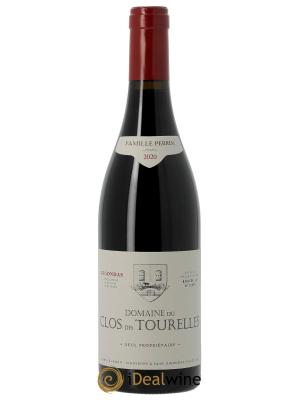Wine for sale: Clos des Tourelles

Clos des Tourelles
Le Clos des Tourelles belongs to the same family who owns the famous château de Beaucastel. Entirely cultivated following methods of organic agriculture, the Château de Beaucastel vineyards produce one of the best Châteauneuf-du-pape in the appellation. Located in Courthézon since the 16th century, the Perrin family count amongst the best vinifiers in the southern Rhône. Today, Jean-Pierre and François, the sons of Jacques Perrin, and their respective children Marc, Pierre, Thomas and Matthieu, who represent the 5th generation have taken the helm. In just a few years, the Perrin family have become one of the most influential families in the wine world thanks to their exceptional vines in Château de Beaucastel that cover 130 hectares (of which 100 are planted) planted to 13 different varieties. The vines are on average 50 years old and yields never exceed 30 hectolitres per hectare and are often much less. Over the last 15 years the Perrins have also acquired vines in other southern Rhône appellations with the intention of becoming a true specialist of this region. Amongst the vines they have recently purchased are 10 hectares of old Grenache in Gigondas: Domaine du Clos des Tourelles. The Tourelles vineyard is composed of Grenache (80%), Syrah, Cinsault and Mourvèdre planted on limestone, marne and sandy soil. Chemical fertilisers are completely forbidden on this domain and have been replaced with a ‘home-made' compost. Insects and birds have gradually been seen returning to the vines. It's worth noting that Château de Beaucastel was the first vineyard in the Rhone valley to convert to organic agriculture in the 1950s and to become biodynamic in 1974. The grapes are picked by hand and then meticulously selected. They are destemmed before being vinified in vats and matured in oak barrels for one year. All of the varieties are vatted separately in order to respect their character, aromas and their individuality. After maturing, the wines then lay in bottles for one more year at the domain.
- Gigondas Clos Des Tourelles (Domaine du) Famille Perrin 2019€37
- Gigondas Clos Des Tourelles (Domaine du) Famille Perrin 2017€42
- Gigondas Clos Des Tourelles (Domaine du) Famille Perrin 2016€49
- Gigondas Clos Des Tourelles (Domaine du) Famille Perrin 2012€35
- Gigondas Clos Des Tourelles (Domaine du) Famille Perrin 2011€59
- Gigondas Clos Des Tourelles (Domaine du) Famille Perrin 2010€63
